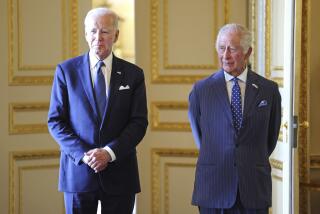Allies Agree on Air Strikes, Still Debating Troops
- Share via
WASHINGTON — The United States, Britain and France agreed on Wednesday to use U.S.-led NATO air strikes to protect the Bosnian Muslim city of Gorazde if Bosnian Serbs attack it, but the allies remained divided over a French proposal to reinforce the town with 1,000 European troops transported by U.S. helicopters.
President Clinton spoke by telephone with British Prime Minister John Major and French President Jacques Chirac, but the allies failed to reach full agreement on a plan to bolster the disintegrating United Nations peacekeeping mission in Bosnia-Herzegovina.
As a result, the three biggest Western powers faced a potentially embarrassing deadlock on the eve of a Friday meeting of their foreign and defense ministers in London.
Officials said the three governments agreed to make a major effort to deter a rebel Serb attack on Gorazde and that air strikes should be a major part of their strategy.
But French Prime Minister Alain Juppe declared that his government also “insists” that the allies move fresh U.N. peacekeeping troops into Gorazde to protect civilians there.
U.S. and British officials, however, fear that airlifting more troops into the encircled city would not deter the estimated 12,000 nationalist Serb militia in the area from attacking--and would endanger both the peacekeepers and the helicopter crews transporting them.
Secretary of State Warren Christopher left for London on Wednesday evening, a day ahead of schedule, to try to work out an agreement among the allies.
The Clinton Administration also faced dissent at home as the Senate moved toward passing a binding resolution requiring the United States to break the arms embargo in the Balkans.
But after days of intense lobbying, Clinton appeared to have persuaded Senate Majority Leader Bob Dole (R-Kan.) to postpone the vote until early next week to avoid undercutting Christopher at his meeting with the allies in London on Friday.
Times staff writer Michael Ross contributed to this report.
More to Read
Sign up for Essential California
The most important California stories and recommendations in your inbox every morning.
You may occasionally receive promotional content from the Los Angeles Times.














